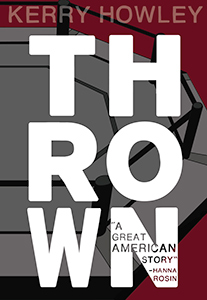The addictive ecstasy of a good mixed martial arts fight
Kerry Howley's Thrown is a philosophical take on brawling that throws a punch


A free daily email with the biggest news stories of the day – and the best features from TheWeek.com
You are now subscribed
Your newsletter sign-up was successful
The fight book of our generation has landed. And that's no small thing. Sport-fighting has always attracted some of the best writers. Homer wrote beautifully on a fight between Epeios and and Euryalos in The Iliad. William Hazlitt's 1822 account of a fight includes this very contemporary-feeling description:
By this time they had stripped, and presented a strong contrast in appearance. If Neate was like Ajax, "with Atlantean shoulders, fit to bear" the pugilistic reputation of all Bristol, Hickman might be compared to Diomed, light, vigorous, elastic, and his back glistened in the sun, as he moved about, like a panther's hide.
Boxing, in particular, has inspired beautiful prose and observation. Joyce Carol Oates, a real fighthead, knew that a fight writer often bled into the subject. Her 1994 introduction to On Boxing — her collection of essays on the sport, and Mike Tyson specifically — begins by noting, "No other subject is, for the writer, so intensely personal as boxing. To write about boxing is to write about oneself — however elliptically, and unintentionally."

Kerry Howley's excellent book Thrown takes this personal aspect for granted. But this time mixed martial arts is the official subject, rather than boxing, which has, perhaps permanently, lost the fight scene to its much more aggressively and centrally governed rival.
The Week
Escape your echo chamber. Get the facts behind the news, plus analysis from multiple perspectives.

Sign up for The Week's Free Newsletters
From our morning news briefing to a weekly Good News Newsletter, get the best of The Week delivered directly to your inbox.
From our morning news briefing to a weekly Good News Newsletter, get the best of The Week delivered directly to your inbox.
Thrown may be an acquired taste. It blends rigorous nonfiction reportage on two fighters from the Midwest, told through the voice of a fictionalized narrator, Kit, a woman who both is and isn't the actual author. Kit's attachment to her subjects, falling journeyman Sean Huffman and rising star Erick Koch, comes out of her quest to relive, again and again, the ecstasy she experienced when she stumbled upon her first live fight, which was happening across from a conference she was attending on phenomenology. This was the moment that turned Kit into a devotee, and led her to aspire to become the "fighterly accoutrement" known as the "spacetaker."
From that position, she can try to rediscover this experience that pulls her out of herself. A sample passage:
When LaVerne shot out, all those gorgeously cut men behind him, and the ring girl swung her ceremonious hips round the ring, and the announcer drew out the "a" in "Huffman" like a spinning record momentarily stuck, and some especially perceptive nerve in the back of my neck began to twitch — then, I thought, in concise paraphrase of Nietzsche, "order vies with chaos at the point where the orders of beauty collapse." That's when the taunting started.
"Kick him in his fat ass!" shouted one of LaVerne's men sitting cageside.
I know what you're thinking, dear reader, but let me assure you that Howley never falls into the trap you sense beneath her, the one where she merely uses this play between her supple mind and the reality of MMA to make a series of meaninglessly entertaining high- and low-brow contrasts. Kit takes her fighters almost too seriously, and her references to Schopenhauer and Artaud are not examples of mocking superiority, but her own desperate attempt to grab onto the light, vigorous, elastic bodies careering into violent action. Her reverence for the Octagon — the MMA ring where battle takes place — is religious; Kit believes in the one true Octagon, which becomes present, like the holy of holies, whenever a true fight occurs.
And like a good zealot, Kit comes to despise sentimentality. Her assessment of her subjects can draw blood: "'Wife,' I wrote in my notebook. 'Prefight self-pity.'"
A free daily email with the biggest news stories of the day – and the best features from TheWeek.com
In addition to its ripping descriptions of Brazilian jujitsu and its forays into philosophy, Thrown presents the whole social enterprise around MMA, including the big-talking nobodies, the bouncers who train for a little bit and spend a lifetime talking about what would have been; the ring girls that make Kit self-conscious; the way fighters, within seconds of the referee ending the match, grin and touch gloves.
Kit achieves her goal to become a "spacetaker," even throwing her own arms around her fighter in front of a crowd: "My moment of embarrassment had already transformed into a glow of pride. The entire room saw that I was his, and he mine." Journalist and subject collide in ways just as fraught as a fight.
Thrown is a fantastic debut, and an immediate addition to the great canon of fight-lit, down from Jack London to O.Henry to Oates. If you can navigate this breakthrough in nonfiction, you may feel a bit of ecstasy, too. Howley's contemporaries should feel beat up after reading it; I did.
Michael Brendan Dougherty is senior correspondent at TheWeek.com. He is the founder and editor of The Slurve, a newsletter about baseball. His work has appeared in The New York Times Magazine, ESPN Magazine, Slate and The American Conservative.
-
 What are the best investments for beginners?
What are the best investments for beginners?The Explainer Stocks and ETFs and bonds, oh my
-
 What to know before filing your own taxes for the first time
What to know before filing your own taxes for the first timethe explainer Tackle this financial milestone with confidence
-
 The biggest box office flops of the 21st century
The biggest box office flops of the 21st centuryin depth Unnecessary remakes and turgid, expensive CGI-fests highlight this list of these most notorious box-office losers
